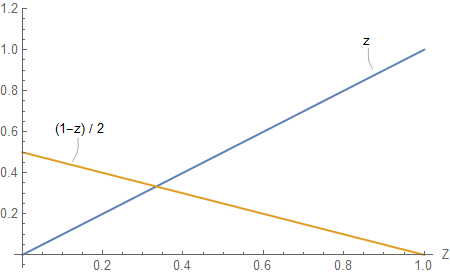I cannot figure out why I'm getting a negative value running NIntegrate to calculate my triple integral. Below is my code:
S = 40
p1 = 0.37
p2 = 0.43
p3 = .05
UND = 1 - (p1 + p2 + p3)
b1 = S*p1
b2 = S*p2
b3 = S*p3
b4 = S*UND
x1 = 48
x2 = 47
x3 = 4
x4 = 1
NIntegrate[(x^(x1 + b1 - 1))*(y^(x2 + b2 - 1))*(z^(x3 + b3 - 1))*((1 -
x - y - z)^(x4 + b4 - 1)), {z, 0, 1}, {x, z, (1 - z)/2}, {y, 0, x}]
I want to triple integrate the function:
f(x,y,z) = (x^(x1 + b1 - 1))*(y^(x2 + b2 - 1))*(z^(x3 + b3 - 1))*((1 -x - y - z)^(x4 + b4 - 1))
I want to do the following:
S S S f(x,y,z) dy dx dz
where: y goes from 0 to x
x goes from z to (1-z)/2
z goes from 0 to 1
Can anyone tell me what I'm doing wrong please?


cp? $\endgroup$